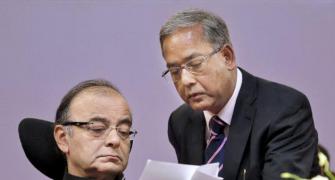The second-longest serving chairman introduced quite a few measures for the primary market and implemented a new corporate governance framework.

UK Sinha’s six-year term as chairman of the Securities and Exchange Board of India, the second longest after that of DR Mehta, ends in two weeks, bringing down the curtains on a tenure during which the 1976-batch Indian Administrative Services officer from the Bihar cadre administered many significant changes in the securities market.
Some of Sinha’s big measures since he took charge on February 18, 2011, are implementing the minimum public shareholding norms for private and government entities; introducing the new corporate governance framework derived from the Companies Act, 2013; implementing Takeover Code regulations to increase the open offer trigger and size; overseeing the merger between Sebi and erstwhile commodities regulator Forward Markets Commission (FMC); and steps to boost the primary market like shortening the listing timeframe and changing the allotment process to accommodate more retail investors.
Some of the reforms to Sinha’s credit include implementing uniform know-your-customer rules for the entire securities market, setting up a sprawling campus for Sebi’s educational arm NISM on the outskirts of Mumbai, and ushering in a new regime for foreign portfolio investors (FPIs) and alternative investment funds (AIFs).
During Sinha’s tenure, the government allowed Sebi to conduct search and seizure operations and also empowered it to issue disgorgement orders.
Unlike his predecessor CB Bhave, Sinha’s tenure lacked any abrupt action such as turf wars with others regulator or overnight changes to the mutual fund commission structure; however, it had its own share of controversies.
The first one erupted within days of Sinha assuming office when a public interest litigation was filed challenging his appointment, alleging irregularities. The PIL was dismissed by the Supreme Court after nearly four years.
Another controversy emerged when Sebi’s former wholetime member KM Abraham shot off a letter to the then Prime Minister Manmohan Singh in 2011 alleging he was under pressure from Sinha to favour the Multi Commodity Exchange and corporate houses like Reliance and Sahara.
Sinha stood his ground on implementing the minimum public shareholding norms and Sebi not only stuck to the deadline for meeting them but also acted against 105 companies, including those from the Tata, Adani and Essar groups.
Sebi with equal rigour made the government dilute at least 10 per cent stake in all listed public sector undertakings. The move helped deepen the Indian capital market and improve price discovery.
Sinha also had to oversee the tricky merger between Sebi and FMC, which was triggered by a Rs 5,600 crore scam at National Spot Exchange Ltd. The merger involved issuing new regulations and bringing commodity market intermediaries and FMC employees under Sebi’s fold.
The FPI regulations were hailed by most market participants. Incidentally, Sinha was the chairman of a government committee set up in 2010 to ease norms for overseas investors.
This experience proved handy at Sebi. Similarly, the AIF regulations provided a boost to the venture capital industry and helped many startups.
Sebi introduced many new measures for the primary market during Sinha’s tenure. To reduce opening-day volatility and to curb manipulation, the regulator brought in circuit filters for listing day.
It also changed the allotment process in initial public offers (IPOs) to ensure allotment to as many retail applications as possible.
It shortened the time between an IPO closing and listing to six days and made large-scale changes to the buyback and delisting framework.
Another highlight of Sinha’s term was implementing the new corporate governance framework, which empowered minority investors by providing them equitable treatment and brought greater transparency in board-level activities and related-party transactions.
It also had provisions to ensure promoters did not have their way at the cost of ordinary shareholders.
In fact, the provisions were so stringent that some corporate titans raised their voices against them, forcing the government and Sebi to dilute a few rules.
To address the capital-raising needs of new-age technology companies, Sebi introduced a separate listing platform meant for startups.
The norms for listing on this platform were far more relaxed than those on the main exchanges.
Despite Sebi’s efforts, the concept failed to take off in a meaningful way. Similarly, other new instruments such as municipal bonds, real estate investment trusts (Reits) and infrastructure investment trusts (InViTs) also have not made much headway.
Another area where Sebi faced difficulties was over illicit money collection schemes, the so-called collective investment schemes (CIS).
Changes to the Sebi Act brought CIS regulations under the regulators’ fold, but Sebi faced challenges in cracking down against Ponzi schemes like Sharada and Rose Valley.
In its defence, Sebi said the operators of these schemes exploited the regulatory arbitrage between state and central laws.
Sebi has also delayed passing an order in an alleged insider trading case against Reliance Industries.
Sebi and Reliance Industries were at odds for not settling the matter under a consent mechanism. Reliance Industries had moved the Securities Appellate Tribunal (SAT) on Sebi’s decision not to allow the consent settlement. The SAT ruled in Sebi’s favour in 2014. The regulator, however, is yet to issue a final order in the matter.
Sebi had to face flak often from the SAT for its quality of work, however, the regulator’s success rate before the tribunal improved significantly during Sinha’s tenure.










